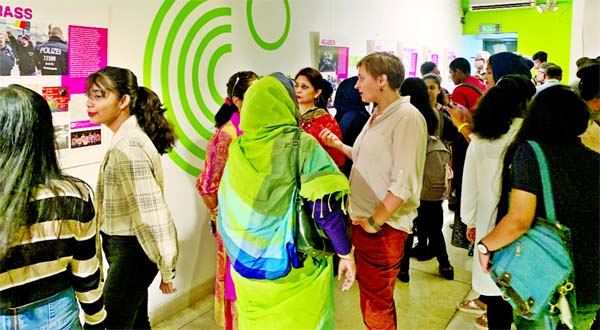
Weekend Plus Desk :
The Goethe-Institut in Dhanmondi organizes the ongoing poster exhibition titled ‘The Power of Emotions. Germany 19|19.’ The display will run through November 30. Opening hours are Sunday-Thursday, 10:00am to 5:00pm.
Entrance is free. ‘Schools: Partners for the Future’ (PASCH) is a global network of 1,800 schools aiming to arouse and sustain interest in and enthusiasm for modern-day Germany and its language. PASCH launched ‘The Power of Emotions’ – an exhibition with photographs and narratives relative to Germany’s past 100 years.
‘The Power of Emotions’ is a poster exhibition, created by German historians and educators Ute and Bettina Frevert, showcasing the last 100 years of German history and politics through the lens of 20 different emotions, including indignation, disgust and enthusiasm. The message is strong and its educational value very present.
On the introductory poster, German Foreign Minister Heiko Maas stated, “This exhibition shows us what is needed in the current political debate: less rage and fear, and greater passion for democracy. This is something worth fighting for together.”
The exhibition was created in the context of the perception that we are living in an age of permanent agitation. Facts are being called into question by perceived truths. Radicals of every description are attracting more and more attention with simple answers to complex questions. The political centre often does not know how to deal with heated emotions. It is characterised by the political culture of the old Federal Republic, where the need for sobriety prevailed.
In 2019, the year of remembrance, the exhibition demonstrates continuities and gaps in the emotions that have shaped Germany the past 100 years, the intensity of which is now presenting a challenge for politics and society. The exhibition was published by the ‘Remembrance, Responsibility and Future’ Foundation and the ‘Federal Foundation for the Study of Communist Dictatorship in East Germany.’
The Goethe-Institut supports five partner schools in Bangladesh, offering German language classes at different levels. PASCH also teaches teachers in both language and modern teaching skills. In five schools, 19 graduates are teaching around 1,400 students.
The Goethe-Institut offers extracurricular activities, such as youth camps in South Asia and Germany.
The Goethe-Institut in Dhanmondi organizes the ongoing poster exhibition titled ‘The Power of Emotions. Germany 19|19.’ The display will run through November 30. Opening hours are Sunday-Thursday, 10:00am to 5:00pm.
Entrance is free. ‘Schools: Partners for the Future’ (PASCH) is a global network of 1,800 schools aiming to arouse and sustain interest in and enthusiasm for modern-day Germany and its language. PASCH launched ‘The Power of Emotions’ – an exhibition with photographs and narratives relative to Germany’s past 100 years.
‘The Power of Emotions’ is a poster exhibition, created by German historians and educators Ute and Bettina Frevert, showcasing the last 100 years of German history and politics through the lens of 20 different emotions, including indignation, disgust and enthusiasm. The message is strong and its educational value very present.
On the introductory poster, German Foreign Minister Heiko Maas stated, “This exhibition shows us what is needed in the current political debate: less rage and fear, and greater passion for democracy. This is something worth fighting for together.”
The exhibition was created in the context of the perception that we are living in an age of permanent agitation. Facts are being called into question by perceived truths. Radicals of every description are attracting more and more attention with simple answers to complex questions. The political centre often does not know how to deal with heated emotions. It is characterised by the political culture of the old Federal Republic, where the need for sobriety prevailed.
In 2019, the year of remembrance, the exhibition demonstrates continuities and gaps in the emotions that have shaped Germany the past 100 years, the intensity of which is now presenting a challenge for politics and society. The exhibition was published by the ‘Remembrance, Responsibility and Future’ Foundation and the ‘Federal Foundation for the Study of Communist Dictatorship in East Germany.’
The Goethe-Institut supports five partner schools in Bangladesh, offering German language classes at different levels. PASCH also teaches teachers in both language and modern teaching skills. In five schools, 19 graduates are teaching around 1,400 students.
The Goethe-Institut offers extracurricular activities, such as youth camps in South Asia and Germany.

